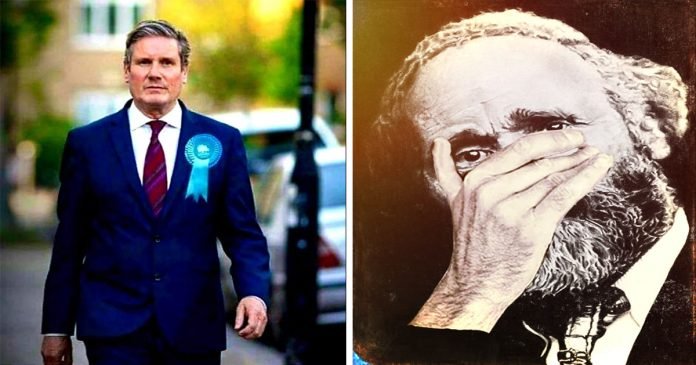
The Toryfication of the Labour Party.
If the Labour Party could be bullied or persuaded to denounce its Marxist, the media -having tasted Blood- would demand next that it expelled all its Socialist and reunited the remaining Labour Party with the SDP to form a harmless alternative to the Conservatives, which could then be allowed to take office now and then when the Conservatives fell out of favour with the public.
Thus British Capitalism, it is argued, will be made safe forever, and socialism would be squeezed off the National agenda.
But if such a strategy were to succeed… it would in fact profoundly endanger British society. For it would open up the danger of a swing to the far-right, as we have seen in Europe over the last 50 years.” -Tony Benn
So it comes to pass, the Toryfication of the Labour Party.
The Toryfication has been brought about by the loss and abandonment of the people, consolidated by the lack of vision, and capped by the rejection of its political ideology.
It is now that the Labour Party has finally been pushed through the doors into the Interregnum, a time of in-between. A time Antonio Gramsci described when he wrote that the crisis precisely consists in the fact that: “The old is dying and the new cannot be born; in this interregnum, a great variety of morbid symptoms appear.”
It is those morbid symptoms that are evident in today’s Labour Party under the tenure of Sir Keir Starmer. He has taken the Labour Party into the Interregnum and abandoned all ideology as if political ideology didn’t matter.
We are now in the inbetween!
This interregnum is the inbetween of the death of the Labour party and the birth of something different.
It was on the day Sir Keir Starmer announced his economic vision for the UK. He also declared he would not be “ideological” about nationalising public utilities, after the shadow chancellor, Rachel Reeves, prompted a backlash by suggesting Labour had ditched plans to take rail, water and energy back into public ownership.
Starmer has now dropped every facet that makes up the Labour Party the same way he dropped has dropped all his promises and pledges.
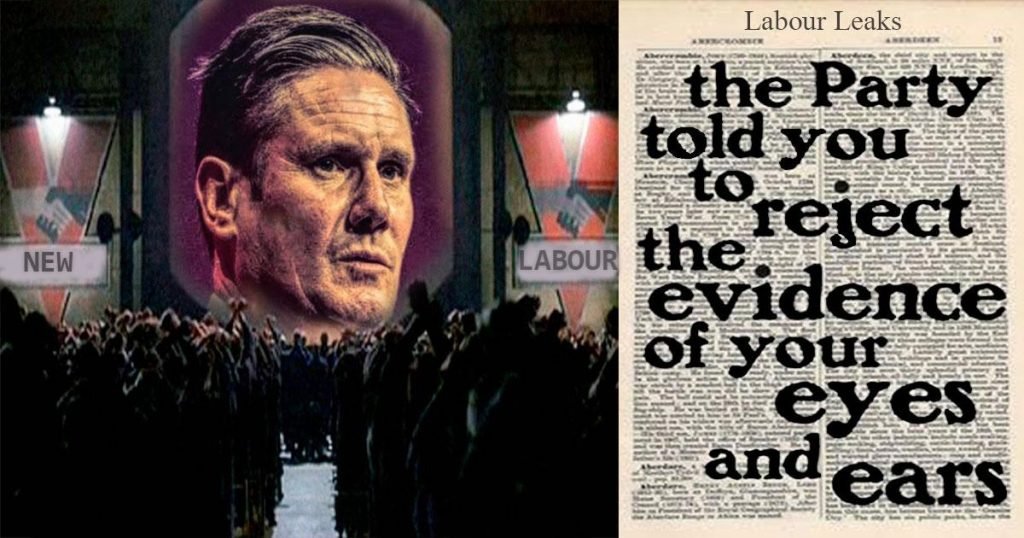
But it is that very ideology that gave hope to the millions of workers that first built the Labour movement.
It is that ideology that transformed the unions into more than a collective of workers fighting each and every individual industrial action, to one that forged a political force that could legislate for workers to bring about not only workplace change but social change, It was that ideology that took us out of those satanic mills, empowering the masses, that ideology created the Labour Party, a Party for the people by the people.
It is that very ideology that separates the Labour Party from other Parties, without which all political Parties become the same, they just offer a variant of the same economic and social policies, a little less or more tax here or there, a little more austerity on this or that.
Starmer says “I take a pragmatic approach rather than an ideological one.”
The fact is we all take a pragmatic approach but that pragmatism also understands the benefits behind public ownership.
So, when sir Keir Starmer claims he has no ideological attachment what attachment does he have and to who?
Labour has not only abandoned workers and support for the Unions but Starmer has abandoned his ten pledges he relied on to get elected leader of the Labour Party.
He has also confirmed last month the abandonment of the Labour manifesto of 2017/19.
This included his pledge on free tuition and raising the income tax on the top 5% of earners, pledges to build social housing, abandoning the manifesto he was voted in on, abandoning the promise of public ownership in any form.
He told the Mirror: “My priority is growth and partnership. Not an ideological attachment to particular models of ownership, he then concluded as if in an afterthought: “Rail is probably different from the others because so much of our rail is already in public ownership.”
Yet, just a few months ago his position on Rail was quite different, Rail like all other pledges of public ownership was scrapped. At this stage, we all understand Starmer cannot be trusted on any pledges or in fact what he says today may well change tomorrow, he is the calibre of politician that Tony Benn declared a weathercock, spinning constantly, appeasing public opinion and right now public opinion is with Rail nationalisation.
Not content at blaming Corbyn, he now blames the very manifesto he was elected on.
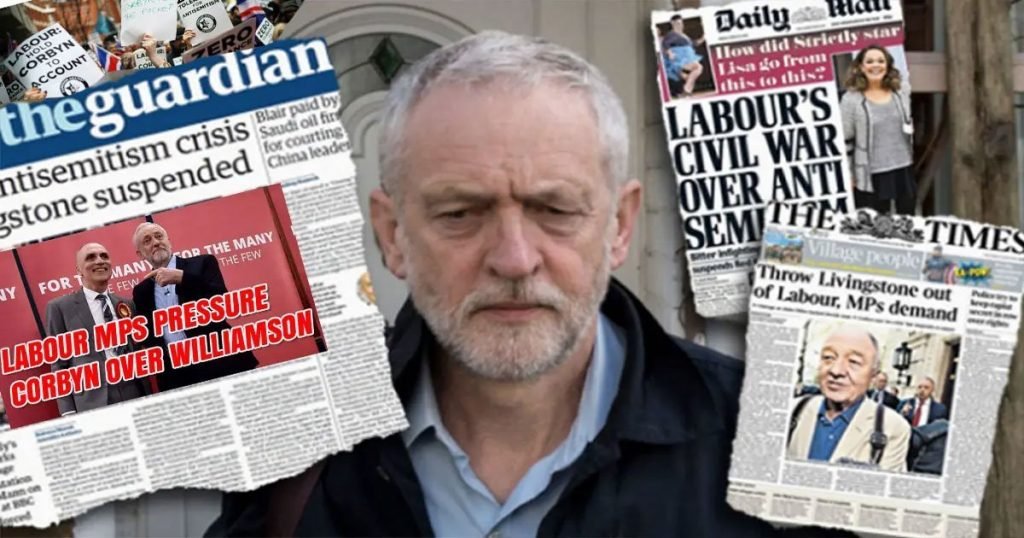
This abandonment comes just as I said it would in my article 2020, at great length I took the time to explain how Starmer would go from blaming Jeremy Corbyn’s leadership for the 2019 election defeat to blaming the manifesto.
How he would claim in 2019 that people rejected an overloaded manifesto from where he would use that untruth to reject the pledge of public ownership of sectors like rail, water and energy even though they enjoy broad support from the public.
Of course, as the architect of the second referendum, Starmer would always put as much distance between that vote-losing policy and Labour’s defeat in 2019 that is as much distance as mentally possible for the sheeple to accept.
Unfortunately, Starmer is relying on the hope that people have short memories, that hope is forlorn, people have very good memories, and people are very well informed.
What’s more, people do not forget abandonment or betrayal. In those things, the Labour Party have proved to be in abundance. Labour is guilty of abandoning the workers in lieu of Business, in their abandoning of the promise to respect the referendum result, in the abandonment and implementation of real social change, in their abandonment of the people in the post-industrial Labour Heartlands.
The Labour party just cannot be trusted.
The Labour Party are also guilty of betrayal, betrayal that is very well documented in the #FordeReport but shown in its raw and disturbing format in the Labour Leaks dossier, a torrent of WhatsApp messages made by staff at Labour HQ showing them in their efforts to implement strategies that not only undermine the Leadership of Jeremy Corbyn but show how they worked to expel socialist members of the Labour Party, more disturbingly how they connived to undermine their own Parties election chances.
The Labour Party are also guilty of betrayal, the betrayal that is very well documented in the #FordeReport but shown in its raw and disturbing format in the Labour Leaks dossier, a torrent of WhatsApp messages made by staff at Labour HQ showing them in their efforts to implement strategies that not only undermine the Leadership of Jeremy Corbyn but show how they worked to expel socialist members of the Labour Party, more disturbingly how they connived to undermine their own Parties election chances.
Forde stated: “We find that the messages on the SMT [senior management team] WhatsApp reveal deplorably factional and insensitive, and at times discriminatory, attitudes expressed by many of the party’s most senior staff.”
Reading the exchange of messages between the plotters is pretty sickening. When the polls showed Labour losing, they cheered. When they showed Labour gaining, they mourned. When the accusations of antisemitism hit the party, they raised their glasses to celebrate – not because they were appalled by antisemitism but because they knew it was a big stick to thrash Corbyn with.
Using their media contacts, they fuelled the anti-Corbyn propaganda machine, planting stories and misinformation designed to paint him as black as possible – all this while their wages were being paid by the subscriptions of party members, the very people who’d elected him as Leader.
As hundreds of thousands of workers and youth signed up to the Labour Party, with illusions that Corbyn would lead a fight against austerity and war, the staff at Labour’s head office were running, in their own words, a “Stasi system” to purge left-wing sentiment, they were set on undermining that fight.
The Labour Party has seen a great transformation over its 122 years, over the past 3 decades it has shifted permanently to the right. It can no longer lay claim to being the Party of the workers, The name is the last echo of Keir Hardie’s hard-fought battles to bring about the emancipation of the workers.
But this final abandonment comes in rejecting its ideology the economic left-wing argument., after all, socialism is at its base an economic argument that opposes capitalism, Socialism is an economic and political system based on collective ownership of the means of production. All legal production and distribution decisions are made by the government in a socialist system. If Labour does not stand for democratic socialism, what does it stand for?
It offers us nothing but an alternative Tory Party, not an alternative to the Tory Party, no longer pretending to be a broadchurch, it has now under Starmer become the Party of the centre.
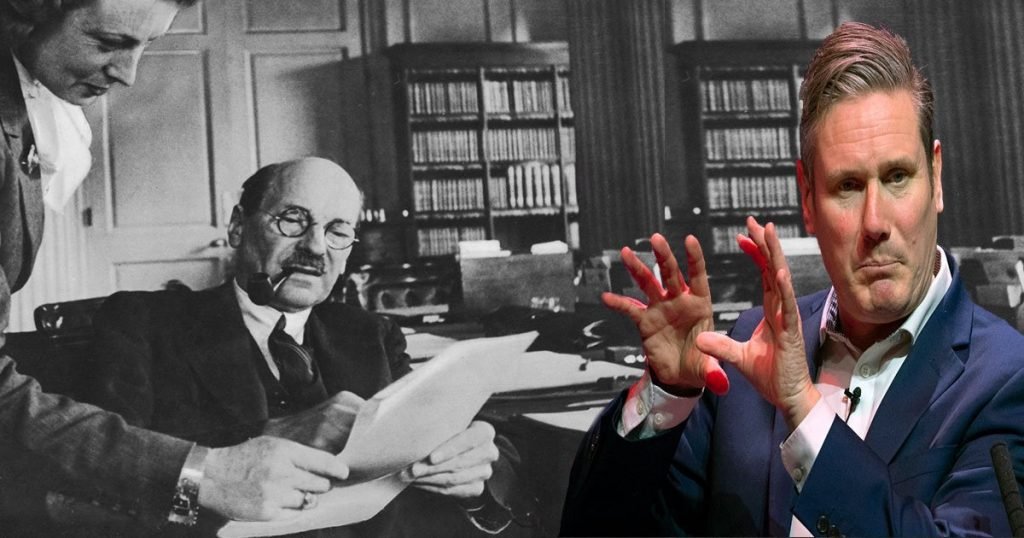
It was Sidney and Beatrice Webb who drafted the original version of Clause IV in November 1917: “To secure for the workers by hand or by brain the full fruits of their industry and the most equitable distribution thereof that may be possible upon the basis of the common ownership of the means of production, distribution and exchange, and the best obtainable system of popular administration and control of each industry or service.”
it was a triumph, a vision, in fact, it was widely seen as the Labour Party’s commitment to socialism, even though the word “socialism” is not explicitly mentioned.
The Manchester Guardian heralded it as showing “the Birth of a Socialist Party”, stating that:
“The changes of machinery are not revolutionary, but they are significant. There is now for the first time embodied in the constitution of the party a declaration of political principles, and these principles are definitely Socialistic. … In other words, the Labour party becomes a Socialist party (the decisive phrase is “the common ownership of the means of production”) … Platonic resolutions have been passed before now, both by the Labour party and by the Trade Unions Congress in favour of the Socialistic organisation of society, but they are now for the first time made an integral part of the party constitution.
In 1918, nationalisation was seen by many voters as akin to modernisation – the nationalisation of the railways was a widely supported policy, for instance, as it would reduce the plethora of uncoordinated and competing companies. This text is usually assumed to involve nationalisation of the whole economy, but close reading of the text shows that there are many other possible interpretations. Common ownership, though later given a technical definition in the Industrial Common Ownership Act 1976, could mean municipal ownership, worker cooperatives or consumer cooperatives.
In December 1944, the Labour Party adopted a policy of “public ownership” and won a clear endorsement for its policies – the destruction of the “evil giants” of want, ignorance, squalor, disease and idleness (identified by William Beveridge in the Beveridge Report) – in the post-war election victory of 1945 which brought Clement Attlee to power. However, the party had no clear plan as to how public ownership would shape their reforms, and much debate ensued.
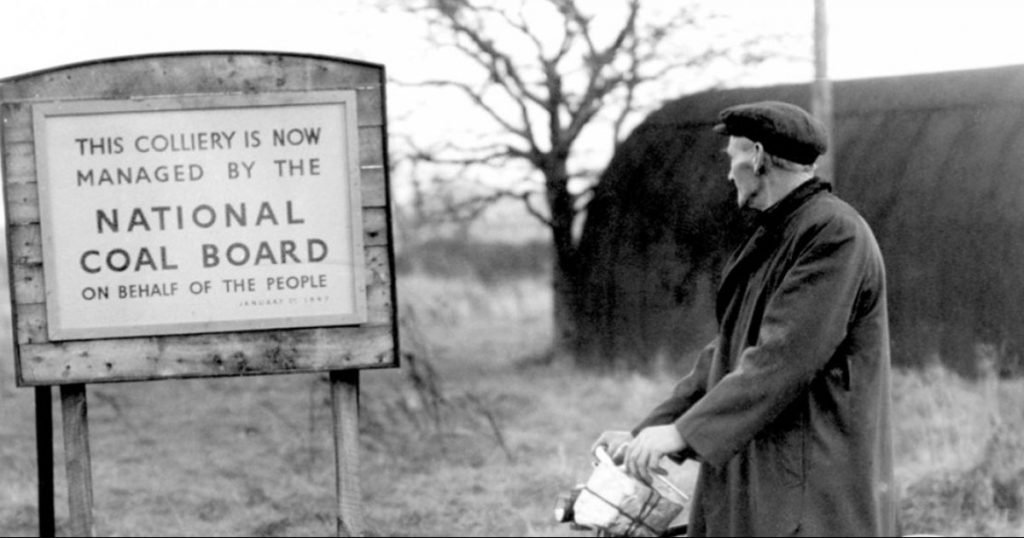
The nationalisation was led by Herbert Morrison, who had had the experience of uniting London’s buses and underground train system into a centralised system in the 1930s. He started with the Bank of England in April 1946, whereby stockholders received compensation and the governor and deputy governor were both re-appointed. Further industries swiftly followed: civil aviation in 1946, and railways and telecommunications in 1947, along with the creation of the National Coal Board, which was responsible for supplying 90% of UK’s energy needs. 1946 also saw the establishment of the National Health Service, which came into force in July 1948; railways, canals, road haulage and electricity were all also nationalised in 1948. By 1951, the iron, steel and gas industries had also been brought into public ownership.
This was the time of Labour’s greatest achievements; Labour answered the call of the people bringing about social change and a real shareholder society.
But just as public ownership benefited the people and helped the coffers of the treasury it also helped businesses. Today businesses, as well as households, are struggling in this cost of living crisis, they are not exempt from energy price rises or the inflation brought about by profiteers.
The cost of manufacturing, heating and transport have all risen. The cost of heating our schools, hospitals and public buildings has also gone up, we understand through the war in Ukraine how energy can be used as a weapon to destabilise and disrupt economies, energy is now a national security issue.
The same with rail, the constant increases in travel cost is not only a burden to the people but to business and again when people are struggling employers will find it hard to retain staff who will either demand a pay rise or look for a better-paid job.
National strikes will be the norm.
The obvious solution is to bring into common ownership rail, water and energy.
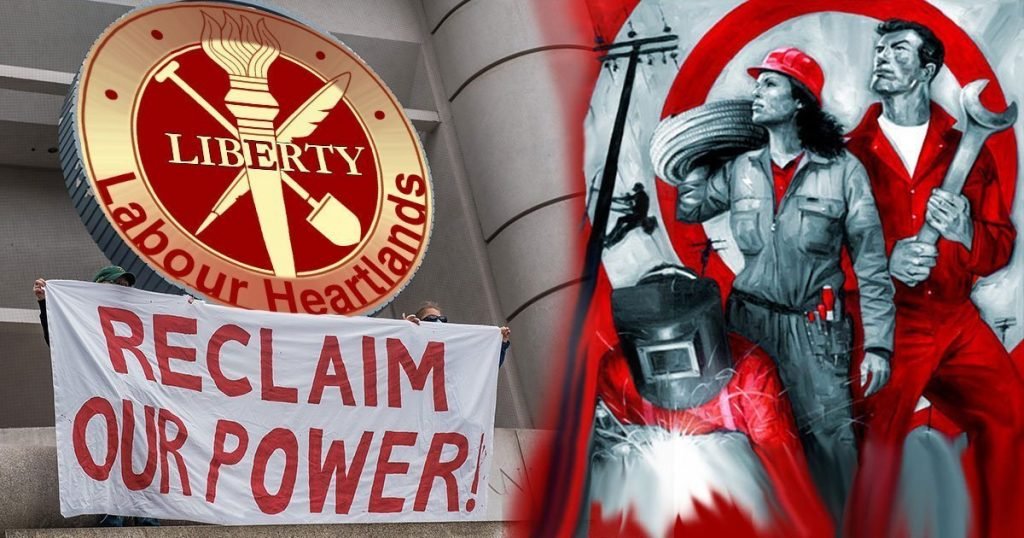
It was that vision that that ideology of public ownership that shaped Britain for generations. Nationalisation not only brought about change for the workers it also benefited the Bosses, oh not the capitalist that wanted profits from the monopoly industries that were now owned by the people but the bosses who relied on good transport and healthy educated people as a workforce.
Starmer’s rejection of public ownership and Labour’s socialist ideology was endorsed by Rachel Reeves his Shadow Chancellor who had said spending billions of pounds on bringing key industries back into public ownership “just doesn’t stack up against our fiscal rules”.
She said Labour had ditched its 2019 manifesto – which included these commitments – as it led to the party’s “worst result since 1935” at the polls.
But the shadow chancellor sparked confusion around Labour’s policy on public ownership of rail in an interview with the Today programme.
Asked if Labour would no longer nationalise water, energy and rail, she said: “I’ve set out fiscal rules that say all day-to-day spending will be funded by day-to-day tax revenues.
This is the Toryfication of the Labour Party. Starmer has laid out his stall smack bang in the middle of the road!
We know what happens to people who stay in the middle of the road. They get run down. The great Aneurin Bevan
It’s quite telling and a little disturbing how far the Labour Party have travelled away from its ideology when unions advocate a very contrasting position and are now openly criticising the Labour Party. It’s also very clear Starmer no longer cares this is part of the abandonment he now seeks corporate donors to fund what once was a party of workers, now an advocate of globalisation and big business over workers.
Perhaps at this point, a name change would be good, maybe drop the pretence altogether and just declare itself the Bussiness Party, after all, they no longer support the workers.
BREAKING 🚨⚡️| We are now calling for public ownership of energy companies.
— Trades Union Congress (@The_TUC) July 25, 2022
The energy cap is expected to increase to £3,200, up over 150% in just a year.
Public ownership would:
✅ Reduce bills
✅ Speed up energy efficiency improvements to homes
✅ Cut carbon emissions faster
Scottish Greens finance spokesman Ross Greer MSP urged Scottish Labour leader Anas Sarwar to confirm if his party now proposed privatising Scottish Water.
Mr Greer said: “Water, energy, railways, and telecommunications are basic public services that should be operated in the public interest.
“Running these essential services in the public sector ensures that profits can be reinvested in improving services, not funnelled away to line the pockets of company shareholders.
“Labour’s latest position on this issue is utterly baffling, particularly given the popularity of putting this essential national infrastructure into public ownership.
“[Its] bizarre positioning on this issue, seemingly in some misguided attempt to distance the party from the Corbyn era, simply reinforces the view that when it comes to the economy there is little difference between Keir Starmer’s Labour Party and the current Conservative government.”
Mr Greer condemned Sir Keir for abandoning his leadership campaign promises in “what looks like a hopeless attempt to curry favour with the corporations and super-rich individuals currently laughing their way to the bank while ordinary people’s bills soar.”
Former Labour leadership candidate Rebecca Long Bailey urged Sir Keir to be “more radical and transformational” on economic policy to maintain a poll lead.
She called on the party to campaign on a manifesto that includes state ownership and a living standards contract between the government and the public, and rejected any suggestion that voters had no appetite at the last election for Labour’s economic policies.
Ms Long Bailey told the Guardian: “We are living through the worst cost-of-living crisis in decades, with household fuel and water bills soaring, while rail fares continue to rack up.
“It’s critical that Labour remains on the side of public opinion here, and that we go into the next election with our existing policies on public ownership.”
Labour MP Zarah Sultana said: “Bringing rail, mail, water and energy into public ownership is hugely popular.
“It’s also key to building a fair, sustainable society. Backing that should be a no-brainer for the Labour Party.”
Recent polling of the red wall by We Own It shows that 68 per cent support public ownership of rail and energy while 70 per cent want water nationalised.
We Own It founder and director Cat Hobbs said: “Dropping these policies would be a mistake, both morally and strategically.
“The cost-of-living crisis has demonstrated, more than ever, that we simply cannot afford to allow private companies to run our key public services for profit.
“We need to bring our public services into public hands, and we need to do it now.”
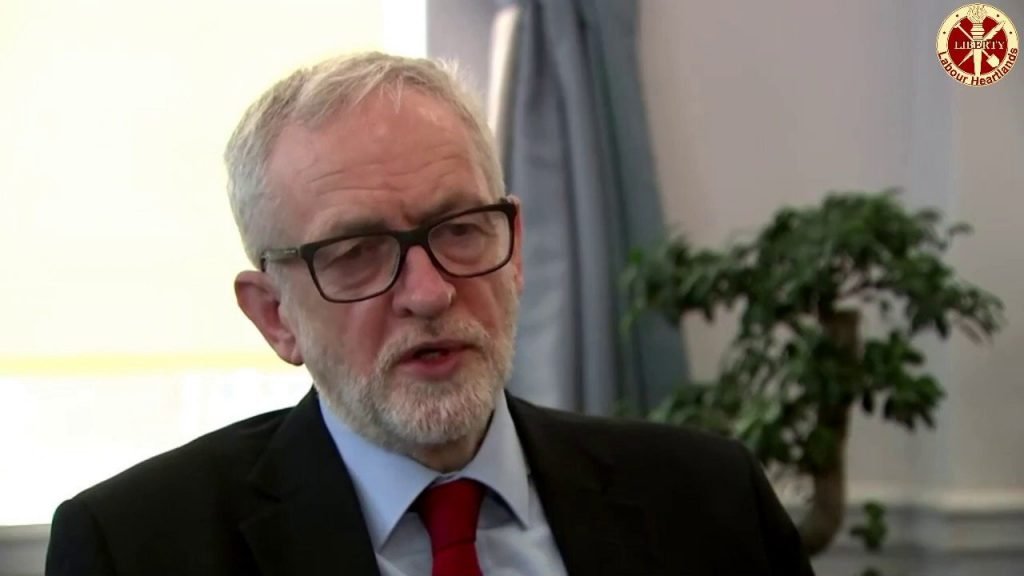
The former Labour leader said: “This is a cost of living crisis where greed, profits and inequality continue to grow. There are more billionaires and more people forced into using food banks than at any other point in history.
“This scandal demands immediate action. The way forward has to be a radical economic alternative, including public ownership of rail, energy, water and the Royal Mail.
“We must recognise that most workers have seen cuts in wages over the past decade, whilst bosses take home record pay and bonuses. Now is the time for a bold alternative to the poverty, misery and desperation faced by millions of families in our communities and workplaces.”
The old is dying and the new cannot be born (yet)
Help Us Sustain Ad-Free Journalism
Sorry, I Need To Put Out the Begging Bowl
Independent Journalism Needs You
Our unwavering dedication is to provide you with unbiased news, diverse perspectives, and insightful opinions. We're on a mission to ensure that those in positions of power are held accountable for their actions, but we can't do it alone. Labour Heartlands is primarily funded by me, Paul Knaggs, and by the generous contributions of readers like you. Your donations keep us going and help us uphold the principles of independent journalism. Join us in our quest for truth, transparency, and accountability – donate today and be a part of our mission!
Like everyone else, we're facing challenges, and we need your help to stay online and continue providing crucial journalism. Every contribution, no matter how small, goes a long way in helping us thrive. By becoming one of our donors, you become a vital part of our mission to uncover the truth and uphold the values of democracy.
While we maintain our independence from political affiliations, we stand united against corruption, injustice, and the erosion of free speech, truth, and democracy. We believe in the power of accurate information in a democracy, and we consider facts non-negotiable.
Your support, no matter the amount, can make a significant impact. Together, we can make a difference and continue our journey toward a more informed and just society.
Thank you for supporting Labour Heartlands











